Mammals of Innisfail. 2. Their mite parasites.
R Domrow
Australian Journal of Zoology
10(2) 268 - 306
Published: 1962
Abstract
A systematic review is given of a collection of over 57,000 parasitic mites collected from 1370 small mammals taken in the Innisfail area, north Queensland. The laelaptids comprised 46% of the total, the trombiculids 41%, and six other families (mainly Listrophoridae) 13%. Sixty-four species and 30 genera were represented as follows : Laelaptidae 11 genera 21 spp. Trombiculidae 7 genera 26 spp. Spinturnicidae 2 genera 2 spp. Teinocoptidae 1 genus 1 sp. Speleognathidae 1 genus 1 sp. Psoroptidae 1 genus 1 sp. Myobiidae 2 genera 3 spp. Listrophoridae 5 genera 9 spp. Twenty-two host species were examined, comprising 1 monotreme (Tachyglossus), 1 marsupial mouse (Antechinus), 2 bandicoots (Perameles and Isoodon), 3 rat-kangaroos and pademelons (Hypsiprymnodon, Aepyprymnus, and Thylogale), 9 rats and mice (Hydromys, Uromys, Melomys (2 spp.), Rattus (4 spp.), and Mus), and 6 bats (Rhinolophus, Hipposideros, Miniopterus (2 spp.) , and Pteropus (2 spp.)). Almost all of the 21 species of Laelaptidae are clearly dependent on host, and not on habitat. In a single habitat such as rain-forest, the species are confined to one host - e.g. four species of Laelaps are restricted to Ratrus ussimilis, but L. southcotti is always found on Uromys. Further, hosts with a broad habitat range are infested by the same parasite over their entire range Australolaelaps to Thylogale, Peramelaelups to Perameles, and Ichoronyssus, Spinolaelaps, and Neolaelaps to bats. Two species of Haemolaelaps and Mesolaelaps anomalus are found only on bandicoots, while M. sminthopsis is a parasite of marsupial mice alone of the several small mammals characteristic of rain-forest. Seven of the eight species of Laelaps are also host specific, four to Rattus assirnilis, one to Melomys, one to Uromys, and one to Hydromys.https://doi.org/10.1071/ZO9620268
© CSIRO 1962


